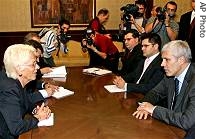2006年VOA标准英语-ICC Prosecutors Say the International Criminal(在线收听)
By Nina Maria Potts
The Hague
16 October 2006
watch ICC report
International justice needs the support of the international community -- that's the word from chief prosecutors from the International Criminal Court, and its ad hoc tribunals. Chief prosecutor for the Yugoslav war crimes tribunal Carla del Ponte is calling on the permanent ICC to take over trials and nail down major war crimes suspects -- a task she cannot complete if the United Nations cuts the purse strings.
The seat of global justice: the International Criminal Court in the Hague, and hub of its special tribunals for the former Yugoslavia, Sierra Leone, the Democratic Republic of the Congo, Rwanda and now Cambodia.
Here, chief prosecutors gathered to discuss common problems. Not recognized by the United States, the ICC struggles to assert its jurisdiction over national sovereignties. Funding too is an issue.
 |
| Chief U.N. war crimes prosecutor Carla Del Ponte (l) speaks with Serbia's President Boris Tadic (file photo) |
The United Nations, which spends more than 300 million dollars a year on the court, wants the trials wrapped up by 2008 and the Yugoslav tribunal closed by 2010.
In the face of this pressure, Del Ponte says her investigation may run out of money. "What shall we do? Ask for voluntary contributions? Transfer the cases to third countries? Or transfer the remaining cases to the countries where the crimes were committed or where the accused reside, despite the lack of preparedness of these jurisdictions for such big cases?"
Del Ponte acknowledges the trials must be sped up. She says transferring cases to the crime's region may not be the best solution -- the move may be politically acceptable, but a judicial disaster.
Charles Taylor, former Liberian leader and war crimes suspect, was transferred to The Hague because of fears his trial would provoke regional instability. His trial start date is scheduled for April next year -- by then he'll have been in jail for over a year.
Acting ICC chief prosecutor Christopher Staker, stresses the Taylor case is just one of several. He says the fact the Sierra Leone war crimes tribunal is run out of Freetown, on voluntary contributions, makes for a more focused investigation, and breaks down local misperceptions.
"We are not going to prosecute anybody simply for having been one of the combatants in the armed conflict. But we explain what international law prohibits, within an armed conflict. It's [It prohibits] for soldiers to attack people who are not participating in the conflict, to attack civilians, to pillage, to loot or plunder, to torture people, to hack off people's limbs with axes. And when it is explained in those terms, people understand that."
Another African war crimes suspect awaits trial at The Hague. Thomas Lubanga Dyilo is accused of recruiting child soldiers who then participated in the mutilation and rape of civilians during the Democratic Republic of the Congo's five-year civil war.
The ICC has in the past been criticized for focusing too much on Africa. It is an accusation Fatou Bensouda, the ICC's deputy prosecutor, rejects. "In the selection of our cases, we look at the grievous crimes, the crimes that have the most gravity at the time they were committed."
The ICC may want to try the worst crimes, but it relies heavily on the co-operation of host countries.
Serbia's reluctance to hand over key fugitives, has deeply frustrated chief prosecutor Carla Del Ponte. "I must tell you the truth, I don't see any signs of reconciliation. Not in Bosnia, not in Croatia. It is true that they are living now a little bit in peace, together, but they are ready to start again fighting each other."
Few illusions, then, for international prosecutors who stress post-conflict reconciliation is not within their scope, but a welcome by-product of delivering justice.
Instead, chief prosecutors say, trials must be sped up and convictions handed down. And they need money and international support to achieve that.